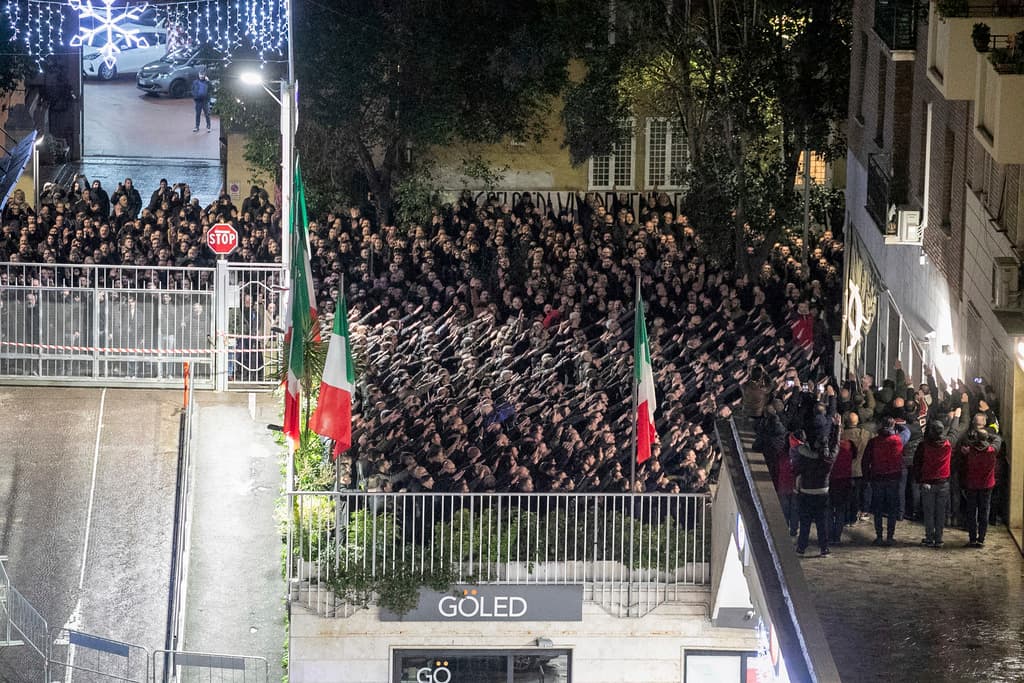There It Goes Again: Italy’s Left Conjures a Controversy To Divert From the Successes of Giorgia Meloni
Amid the controversy over the Acca Larentia massacre, Italy’s premier steers for the shores of liberty and economic growth.

There it goes again. Italy’s left, exasperated by the popularity of the decisively non-authoritarian premier, Giorgia Meloni, is reverting to the fear-mongering that failed to sway voters in 2022. The latest flare-up follows the annual commemoration of the Acca Larentia massacre in 1978 of three rightist youths by leftist radicals.
This year’s ceremony, last week, saw scores of misguided individuals raising their right arms in the Roman salute, a gesture equated with Il Duce‘s Fascist party. Since coming to power in 2022, Signora Meloni has underscored her Fratelli d’Italia party’s disavowal of any form of “nostalgia for fascism, racism, or anti-Semitism.”
However, the fallout from last week’s incident runs the risk of sullying Signora Meloni’s moderate image in Europe while at the same time alienating the premier’s right-wing base. Under post-war Italian law, any promotion of fascism or its symbols can lead to 12 years in jail.
The incident prompted opposition leaders to ask Ms. Meloni’s
government to “explain why the police didn’t intervene,” Politico reported, and “called for stronger laws to prosecute support for fascism, and proposed that neo-fascist groups should be dissolved.”
Predictably, the head of the left-wing Partito Democratico, Elly Schlein, wasted no time posturing on social media: “This is Rome, 7 January 2024. It seems like 1924.” She added: “What happened is unacceptable. Neo-fascist groups must be disbanded.”
Ms. Schlein’s fellow party member Stefano Graziano said “Whoever does not openly condemn gestures that are fascist, racist, or Nazi is complicit.” Giuseppe Conte’s Movimento Cinque Stelle called on Prime Minister Meloni to denounce the saluting marchers. Signora Meloni’s Foreign Minister, Antonio Tajani, responded: “We’re a force that certainly isn’t fascist, we’re anti-fascist.”
The deputy speaker, Fabio Rampelli, the senior member of Signora Meloni’s party, who had attended, affirmed that the people who saluted did not belong to their party. While the party honors “the memory of the three boys barbarically killed 46 years ago,” Mr. Rampelli said, it “does not take part in that type of demonstration.” He added that “it’s not our style, it’s not our philosophy.”
Echoing Signora Meloni’s consignment of Fascism to the ash heap of history, he further noted that Fratelli d’Italia is “light-years away” from such outbursts. Italy’s top news agency, Ansa, said more than 100 marchers at the event saluted. Yet long before that, the prime minister repudiated Mussolini’s reign, calling his antisemitic racial laws “the worst moment in Italian history.”
Such repudiations, though, are never enough for the left — especially in light of Acca Larentia. The author of “Mussolini’s Grandchildren: Fascism in Contemporary Italy,” David Broder, avers that “Meloni’s government says Mussolini is history now, but is much less willing to clearly break ties to its neo-fascist martyrs.”
Such sniping might explain why the prime minister views the furor as a well-orchestrated broadside against her party, rather than condemning the individuals play-acting as fascisti. Taking to Facebook, she penned a riposte: “This government continues to respond to the gratuitous attacks and exploitative controversies of recent days by certain opposition parties with facts and results.”
In the leadup to the 2022 elections that propelled Signora Meloni’s coalition to power in Italy, author Roberto Saviano was among those sounding the alarm about her supposed authoritarian instincts. Mr. Saviano wrote in the Guardian that she “presents a danger to the democratic balance in Europe. Her leadership looks to be the antithesis of what Italy needs.”
Mr. Saviano claimed that Ms. Meloni’s rallying cry of “Dio, patria, famiglia” — “God, homeland, family” — was a fascist slogan. In truth, this patriotic refrain originated with one of the fathers of Italy’s Risorgimento, Giuseppe Mazzini.
Though he eventually came to appreciate Prime Minister Meloni, President Biden depicted her as a would-be authoritarian in remarks after Italians voted in 2022, warning that “democracy is at stake” and “you just saw what’s happened in Italy in that election.”
Yet unlike Signora Meloni, who has denounced the Mussolini regime, the Italian left rarely, if ever, denounces figures like Stalin or Mao. Indeed, the socialist war horse, Sandro Pertini, president of the Republic between 1978 and 1985, eulogized the Soviet dictator as “a giant of history,” arguing “the sun will never set on his memory.”
Signora Meloni, in defying her critics, has emerged as the leading light of European conservatism. As Italy assumes the presidency of the Group of Seven this year, she faces challenges aplenty. Reinvigorating Italian economic growth amid a possible continental recession in 2024 emerges as the top priority, if she and her governing coalition can steer clear of distractions concocted by the left.

